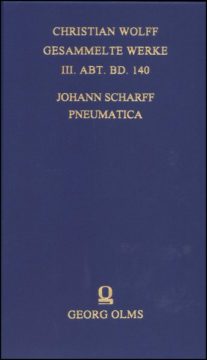Johann Scharff (1595 – 1660) lehrte seit 1627 als Professor für Logik und Metaphysik an der Universität Wittenberg. 1638 übernahm er auch den Lehrstuhl für Ethik und ging 1649 in die Theologische Fakultät über.
Unter dem Begriff Pneumatik oder Pneumatologie verstand man im 17. Jahrhundert die Lehre von den immateriellen und vernunftbegabten, ungeschaffenen wie geschaffenen, Geistwesen im Unterschied zur Körper-Substanz. Sie gliedert sich in eine allgemeine Pneumatik, die das allen „Geistern“ Gemeinsame behandelt, und in eine spezielle Pneumatik, die sich mit Gott, mit den geschaffenen Geistwesen oder Engeln und schließlich mit der menschlichen Vernunftseele befasst.
Diese Disziplin hat Jakob Martini, Scharffs Lehrer an der Universität Wittenberg, zuerst als speziellen Teil der Metaphysik systematisch behandelt. Scharff hat die Pneumatik sodann erstmals zu einer literarischen Gattung erhoben und als Wissenschaft zwischen Ontologie und Physik etabliert, die im Laufe des 17. Jahrhunderts zahlreiche weitere Darstellungen erfahren hat. Scharffs Schrift wurde auch noch im 18. Jahrhundert bei Leibniz und vor allem bei Wolff rezipiert, wo die Pneumatik in die Psychologie einerseits und die natürliche Theologie andererseits einmündet.****************Johann Scharff (1595-1660) became Professor of Logic and Metaphysics at the University of Wittenberg in 1627. In 1638 he also took over the chair of Ethics and in 1649 moved to the Faculty of Theology.
In the 16th century the term pneumatics or pneumatology referred to the study of immaterial and intelligent, created and uncreated spiritual being as opposed to physical substance. It was divided into general pneumatics which dealt with all ‘spirits’ in general and special pneumatics which was concerned with God, with created spiritual beings or angels, and with the rational human soul. Jakob Martini, Scharff’s teacher at the University of Wittenberg, initially treated this discipline systematically as a special part of metaphysics. It was Scharff who first raised pneumatics to the status of a literary genre and established it as a science positioned between ontology and physics, which would be presented in many more forms in the course of the 17th century. Scharff’s work continued to resonate in the 18th century with Leibniz and particularly with Wolff, in whose work pneumatics fed into psychology on the one hand and natural theology on the other.
- Veröffentlicht am Mittwoch 20. November 2024 von Olms, Georg
- ISBN: 9783487148182
- 232 Seiten
- Genre: Aufklärung, Hardcover, Philosophie, Renaissance, Softcover
